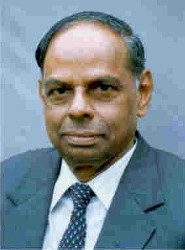 Warning that farm sector distress can have serious consequences on the economy, PMEAC chairman C Rangarajan asked the government on Tuesday to raise additional resources to provide relief to drought-hit people and increase import of essential commodities to check price rise.
Warning that farm sector distress can have serious consequences on the economy, PMEAC chairman C Rangarajan asked the government on Tuesday to raise additional resources to provide relief to drought-hit people and increase import of essential commodities to check price rise.
"Distress in agriculture (due to drought) will have other serious dimensions. The government may have to find additional resources to meet the requirements of the affected people," he told PTI after taking over as the head of the Prime Minister's Economic Advisory Council for the second time.
Regarding the impact of drought on economy, he said, the growth rate could slip to 6-6.5 per cent from 6.7 per cent in the previous fiscal.
"The Indian economy has been doing well in the past several years but the growth rate came down to 6.7 per cent last year because of the impact of international financial crisis. . . this year the economy will grow between 6 and 6.5 per cent. The drought will have dampening impact on the overall growth rate," he said.
"As a result of the drought there is a tendency of the prices to rise... the stock of foodgrains available with the government is large. . . but wherever there is a scarcity and where imports are possible we should do it. If the production of pulses fall there should be a greater effort to import pulses," he said.
Stressing that the government should ensure that imported pulses reach the targeted people, Rangarajan said, there is a need to strengthen the public distribution system.
"We must also ensure that even people above the poverty line get adequate quantity of rice and wheat at prices which are reasonable," he added.
Asked what would be his advise to the prime minister as the chairman of the Council for the growth of economy, he said infrastructure sector needs to be strengthened for the economy to pick up.
". . .we really need to ensure that the infrastructure sector is strengthened and within the infrastructure sector the most important element is power -- both over the medium and short term. The focus of the government must be on ensuring that adequate capacities are created," he said.
"We need to monitor in a very intensive way the additional capacities and generation of power. .. there was a large shortfall in the addition to capacities in the 10th Plan. We should not let that story repeat," he added.
Prime Minister Manmohan Singh yesterday reconstituted his Economic Advisory Council bringing back Rangarajan as its head and inducting two new members.
Rangarajan, 77, has replaced Suresh Tendulkar, after quitting from the Rajya Sabha.
The appointment of Rangarajan comes at a time when the government is faced with challenges, at the economic front to steer the economy back to the growth path and on the other hand tackle a looming drought.
Rangarajan had his first stint as chairman from 2005 to 2008 when he was nominated to Rajya Sabha.
The two new members of the PMEAC are Suman Bery, director general of the National Council of Applied Economic Research and V S Yvas, president, Asian Society of Agricultural Economists.
The other economists, who have been retained as PMEAC members are Saumitra Chaudhuri, member, Planning Commission and Govinda Rao, director, National Institute of Public Finance and Policy.
A former Reserve Bank Governor, Rangarajan is a close confidant of Singh and had varied experience having served as RBI governor, Planning Commission member, chairman of the 12th Finance Commission and as Governor of Andhra Pradesh.
Before his elevation as Reserve Bank Governor in 1992, Rangarajan served the central bank as Deputy Governor for over a decade.
He also functioned as the Governor of Andhra Pradesh before taking over as chairman of the 12th Finance Commission in 2003. He was also member of the Planning Commission from 1991 to 1996.
Image: C Rangarajan





